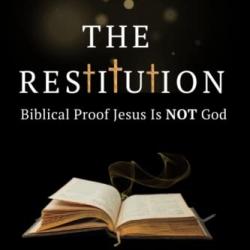Warren Throckmorton posted on December 13 on his Patheos.com blog that Mark Driscoll is involved in establishing a “Bible based church” in North Phoenix, which is the general area where I live. Warren says The Articles of Incorporation say it will be named The Trinity Church and have no official membership. I disagree with that name for a church, but I agree with not having traditional church membership.
How should a church be named? Well, anyone who reads this blog knows that I was a Trinitarian for 22 years and then undertook what I call “my quest for the real Jesus.” That 28-year trek resulted in my authoring a 600-page book, with over 400 scholars cited, entitled The Restitution of Jesus Christ with the pseudonym Servetus the Evangelical. In this book, I claim the Bible does not teach that Jesus was God and neither does it say God is a trinity of persons. The Bible does juxtapose “the Father, the Son, and the Holy Spirit” or the like, but that does not support the teaching that God is three such Persons. In fact, most distinguished biblical scholars nowadays who are Trinitarian agree with this. They merely think that the doctrine of the Trinity is a correct deduction of the biblical data that the church decided upon centuries after the New Testament books and letters were penned.
In case you don’t know it, Michael, Servetus (1511-1553)–the brilliant theologian, medical doctor, and author–was condemned to death by the State of Switzerland at the direction of famous Bible scholar and pastor John Calvin as well as the other pastors of Geneva for having written against the church practice of infant baptism and the belief in the doctrine of the Trinity in his two books entitled On the Errors of the Trinity (1531) and The Restitution of Christianity (1553). The Protestant Reformers had adopted the Catholic Church’s doctrine of the Trinity, arguably, without scrutinizing it. Preeminent church historian Philip Schaff wrote in his eight-volume The History of the Christian Church that Michael Servetus’ condemnation and execution at the stake by burning at the Plateau of Champel on the outer edge of Geneva was “the most thrilling tragedy” of the early decades of the Protestant Reformation.
So, I certainly don’t think it is biblically sound to name a church The Trinity Church. But what about having no official church membership? For twenty years I and my family attended an independent Bible church in Pearland, Texas, named Fellowship Bible Church (not associated with the denomination of that name founded by Dallas Theological Seminary professor Gene Getz). Midway during our time at that church, the board of elders decided to revise their church constitution and doctrinal statement. They invited others to join their series of meetings in which they discussed it and made changes, so I did.
All of the men on the board were my friends, and they knew that I was not a member of the church even though they allowed me to teach Sunday School, which I sometimes did. When I started attending that church, one of my friends was on that board of elders, and he asked me to join the church. That is something I had never done. By that time in my life I had studied church membership and concluded it was both unnecessary and unbiblical. I mean that the early churches that we read about in the New Testament, especially the so-called “Pauline churches,” did not practice official church membership. In fact, that practice was introduced into the church many years later in the Catholic Church.
So, when it came time in these church meetings for the elders to discuss the church constitution that included church membership, one of the elders asked me why I had never joined the church. I said, “I will answer that with a question to you. It is this: Do you think I am a member of the universal church of Jesus Christ?” My friend and elder answered, “Yes.” I replied, “Then how can the leaders of this local church not accept me as a member of it when Jesus Christ accepts me as a member of his much bigger, universal church?” There was silence for a few seconds. Then these men admitted that they had no answer for what I had said.
During most of the 1980s I was a part-time staff member of The Fellowship, centered in Washington, DC, that is most known for its Christian ministry among the members of Congress and hosting the Presidential Prayer Breakfast. Dick Halverson, pastor of the Tenth Presbyterian Church there in the area and Chaplain to the U.S. Senate from about 1980 to 1994, was the foremost leader in The Fellowship. One time Dick, a friend of mine who endorsed my book, The Gospels Interwoven, was the keynote speaker at a mens conference held in Austin, Texas, which I attended. During one of Dick’s presentations, he said that traditional church membership was a travesty that never should have happened to the church. I think I recall he even called it a “sin.” I don’t remember if I ever got to ask Dick later to elaborate on that.
I think traditional church membership further contributes to the devisiveness that exists in Christianity that is most witnessed by its tens of thousands of church denominations. And another contribution to this devisiveness is how churches are named. In the New Testament, all churches that are mentioned and given any sort of name have names that reflect only the location of the church. In contrast, nearly all churches today and for many centuries throughout the world have been named according to some belief, practice, or name of some founder. All of this I regard as originating from a spirit of individualism if not rivalry and therefore not from a spirit of peace and love. Yes, I think a church should only be named according to its location.
However, for the sake of maintaining Christian fellowship, I have never made a big deal about my conviction on this subject, and I have hardly ever mentioned it to anyone. That is, I am convinced of this proposition, but I don’t think its worth getting into a big stew with my brothers and sisters. Now, the doctrine of the Trinity and whether or not Jesus is God, that’s different. Yet, I have always attended Trinitarian churches. But the main reason for that is that there aren’t hardly any other churches that are not Trinitarian.












